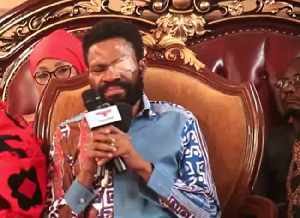Dr Yaw Baah, the Secretary-General of Ghana Trades Union Congress (TUC), has advocated the promotion of skills development for the youth as part of the future of work post-COVID-19.
“We must provide the youth greater access to skill development. We must train and retrain formal sector workers; including public sector workers regularly with special focus on competences, attitudinal change, and work ethics,” Dr Baah said in his presentation at the 12th National Development Forum in Accra.
The Forum organised by the National Development Planning Commission (NDPC) was on the theme: “The Future of Work in Post-COVID-19 Ghana.”
Dr Baah called for intensified effort in the formalisation of the economy.
He also called for the adoption of the German Work Sharing System as a way of preventing mass lay-offs in the formal sector in future.
Concerning what Ghanaians could do to shape the Post-COVID future, Dr Baah emphasized the need for the pursuit of the COVID-19 Alleviation and Revitalisation of Enterprises Support (CARES) programme within the Framework of Ghana Beyond Aid vision.
This, he said, would depend on the ability to transform the economy, which also depends on changes in attitude towards work and respect for work ethics,” he said.
He also argued for the implementation of the National Unemployment Insurance Scheme to protect individuals against the risk of job losses.
He said the Ghana Statistical Service Business Tracker Survey results (which covered 4,311 firms between 26 May and 17 June 2020) indicated that 35.7 per cent of business establishments had to close during the partial lockdown and that 16.1 per cent were still closed after the easing of the lockdown.
Dr Baah said that only 3.5 per cent of firms report that they received government assistance, with “not being aware” of government programmes indicated as the most common reason.
About business confidence, he said firms report substantial uncertainty in future sales and employment, with average expectations of declines of 24 per cent of sales and 15 per cent of employment in the worst-case scenario.
Concerning COVID-19 pandemic and its impact on the economy and jobs and livelihood, Dr Baah said this was a direct consequence of the measures that were implemented by the government to contain the spread of the virus in the country.
He said the measures were needed to stop further spread of the virus and to avert a possible future catastrophe in the country but the negative social and economic consequences of these measures had been monumental.
Mr Ignatius Baffour Awuah, the Minister of Employment and Labour Relations, who chaired the function said Ghanaians were prepared to enter the post-COVID-19 era.
However, they must learn lessons and put in place sustainable policy measures and mechanisms to ensure social justice and effective transition to the future.
“We must invest in technological and innovative work processes to promote the employment and productivity enhancement objectives of the government.”
Professor Emerita Takyiwaa Manuh, the Vice-Chairman, NDPC, said the outbreak of the COVID-19 pandemic had challenged the way people socialize and conduct their business.
She said the measures adopted to control the spread of the virus had promoted the need to circumvent conventional strategies to keep employees productive.
The measures include working from home and the use of virtual media and applications to ensure social and physical distancing.
Dr Kodjo Esseim Mensah-Abrampa, the Director-General, NDPC, said contributions and recommendations from the National Development Forums were very vital to the work of the Commission.
Discussants at the forum were Professor Baah Boateng, Head of Economics Department, University of Ghana, and Dr Ellen Hagan, Founder and Chief Executive Officer, L’AINE Services Limited, Accra.
Business News of Friday, 28 August 2020
Source: GNA



![New IGP, COP Christian Tetteh Yohonu [L] and immediate-past IGP, Dr. Akuffo Dampare New IGP, COP Christian Tetteh Yohonu [L] and immediate-past IGP, Dr. Akuffo Dampare](https://cdn.ghanaweb.com/imagelib/pics/140/14041582.295.jpg)









